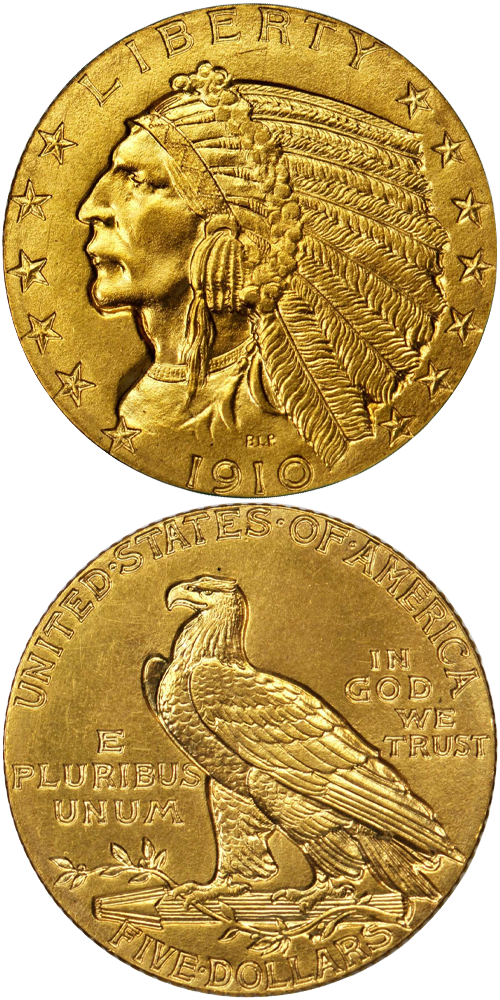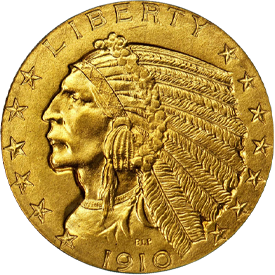Designed by: Bela Lyon Pratt
Issue Dates: 1908-1915
Composition: 90% gold, 10% copper
Diameter: 21.6 mm
Weight: 8.36 grams (129.01 grains)
Edge: Reeded
Proof Mintage: 1,177
In 1908, with the introduction of Bela Lyon Pratt’s Indian head designs on the quarter and half eagle and shortly after St. Gaudens’ designs for the eagle and double eagle, the mint initiated a new finish on its issues of Proof gold coins. Described as a “matte” or “sandblast” finish, it was radically different than the earlier mirrored-surface Proofs, displaying no “luster” in the traditional sense of the word. Contemporary collector reaction to the matte Proofs was lukewarm at best, with many disappointed in the rather dull finish. It was not until the 1960s and 1970s that numismatists began to appreciate the subtle beauty of these coins, and values since that time have steadily advanced.
Proof Indian half eagles were struck in all years from 1908 through 1915. After using a heavy sandblast finish in 1908, the Mint experimented with a satin, or “Roman” finish for 1909 and 1910. This closely resembled the ordinary business or circulation strikes and failed to excite the collectors at the time who almost certainly missed the mirrored fields and frosted devices found on the early pre-1908 Proofs. In 1911 the Mint again returned to sandblasting the coins, resulting in a very dull finish. This technique continued through the end of Proof production in 1915, with a noticeable variation in color from year to year as well as sometimes within a given year. Part of this variation in color is also due to the fact that some of these coins have been dipped or stripped over the years, resulting in a pale yellowish color instead of the original golden-green color.
Quantities stuck varied from a high of 250 pieces in 1910 to a low of only 75 pieces in 1915, but it is widely-believed that the unsold coins at the end of the year were melted, so the actual distribution is certainly lower than the mintage might suggest. The 1910 in particular is suspect, as its availability is about the same as most of the others. Estimates of survivors today range from 40 to 90 pieces of each date with most in the 50-75-coin range. Certified examples today mostly range from PR-64 to PR-67 with a handful of 68s, mostly graded by NGC. Values generally run in the low five-figures for Choice 63 and 64 coins to mid-five figures for Gem 65 and 66s and upper five-figures for 67s. A few of the highest-graded examples have recently broken into six-figures.
While not quite as rare as the eagles and double eagles of the period, $5 Indian Proofs are anything but common, and perhaps appear one or at most two dozen times a year.







